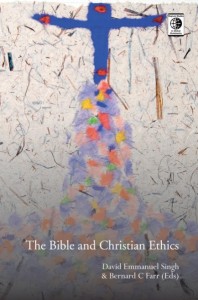The Bible and Christian Ethics, reviewed by Stephen Vantassel
 David Emanuel Singh and Bernard C. Farr, eds., The Bible and Christian Ethics (Oxford: Regnum Books International, 2013), 217 pages, ISBN 9781625643513.
David Emanuel Singh and Bernard C. Farr, eds., The Bible and Christian Ethics (Oxford: Regnum Books International, 2013), 217 pages, ISBN 9781625643513.
This text is a collection of articles on Christian ethics published in the journal Transformation, published by the Oxford Center for Mission Studies. The 18 articles are organized under five different headings.
The first section, “Words and Works,” contains three articles that engage the difficult question of how to use Scripture for moral guidance. Davies, in his article The Ethics of the Hebrew Bible, surveys the different stances taken to derive moral insight from scripture. Samuel’s article, “The Holy Spirit in Word and Works: A Study in John 14 to 16,” argues that in the debate between truth and action our emphasis should tip towards truth. Tollefson appeals to Nehemiah for a model of how leaders can create social transformation in their communities. The next two sections, “Response to Poverty” and “Economic Justice” engage the thorny question of responding to poverty both personally and at an institutional levels. The editors selected several very good articles that deserve wider readership. In particular, Mason’s article, “Biblical Teaching and Assisting the Poor,” provides an interesting interpretation of the Bible’s social welfare policy and provides some key cautions to those who wish to use Scripture to support a welfare state. Getu’s article, “The Biblical Perspective on Transformational Business,” contends that business and profit can be used for social good provided that the owners keep social goals in mind. Mott and Sider, in their article, “A Biblical Paradigm for Economic Justice,” play a contrasting perspective with Mason’s piece. Readers should read both articles together and note areas where the authors agree, where they disagree, and where they speak to different issues. The last article of note is Hartropp’s discussion of how the Bible understands economic justice. His comments are essential reading to ensure that debates between competing visions of abating poverty are using terms in the same way.
The section on Family was somewhat disappointing in that it neglected many of the common issues facing the modern family. It did, however, focus extensively on children, a subject generally neglected in Christian theology and ethics. Unfortunately, I think the articles were more evocative than substantive.
The final section, “Environment,” presented a good overview of major environmental themes contained in Scripture. Unfortunately, the authors too often employed vague platitudes in their comments, such as scripture does not teach exploitation or domination of nature. While such statements need to be made, they also need to be clearly defined as the debate centers on what behavior constitutes abuse versus use. I was disappointed that the authors didn’t engage Jesus’ treatment of the environment, such as the miracle of the fishes, the drowning of the pigs, and the curse of the fig tree. I am not convinced that researchers have sufficiently pondered the significance of Christ’s behavior in these three situations. Readers should also note that Bauckham’s interpretation of Mark 1:13 is likely wrong in light of Heil’s article in Catholic Biblical Quarterly.
Category: Biblical Studies, Winter 2015


